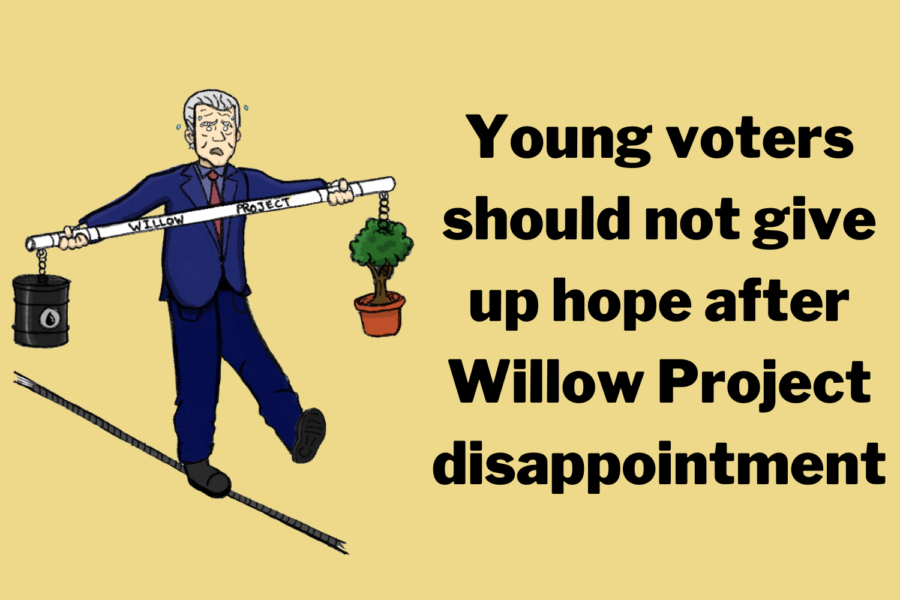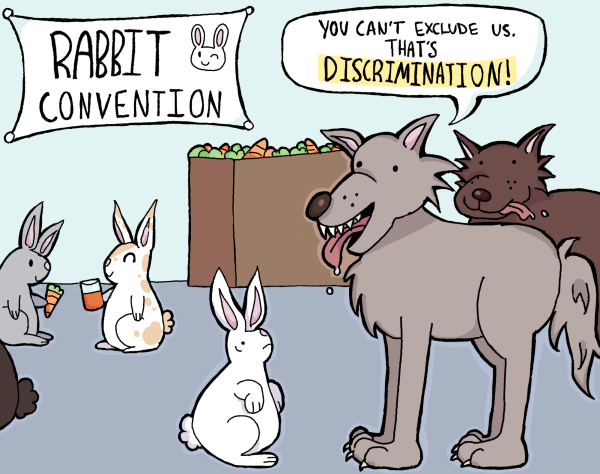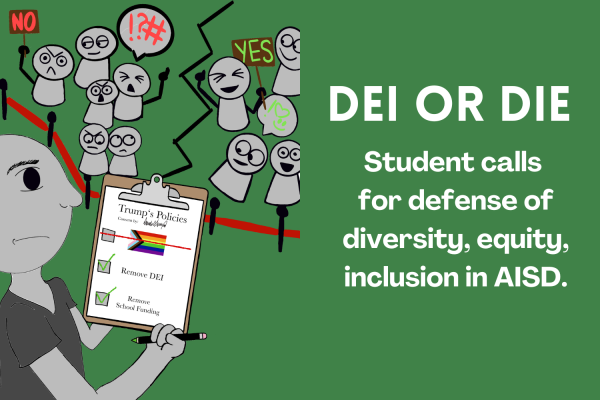Young voters should not give up hope after Willow Project disappointment
The Willow Project is an Alaskan drilling venture proposed by ConocoPhillips, an oil producer, taking place at the National Petroleum Reserve. This region is owned by the federal government, but ConocoPhillips has held the lease rights to this region since 1999, meaning that this project has been in the works throughout five presidents’ administrations. This project is the largest proposed oil project on U.S. public land, making it the biggest oilfield in Alaska in decades.
The project was first proposed in 2018 and was later approved by the Trump administration in 2020. The project was then vacated by a federal district court in Alaska in 2021. The Bureau of Land Management then created a supplemental environmental impact statement and approved the project. In late February and early March, environmentalists began a social media campaign demanding that President Biden halt the Willow Project with his presidential authority because of the fear that it would be a “carbon bomb” and worsen global warming with the release of millions of barrels of oil into the energy market.
Ahead of a deadline for the Biden administration to approve the project, videos on TikTok that were tagged #StopWillow and #StopTheWillowProject amassed 148 million views and 150 million views, respectively, according to the Washington Post.
Activists and experts say the wave of Willow-related TikTok posts sent a clear message to policymakers and politicians: young people, an influential voting bloc for Democratic Party success, care deeply about climate issues and are willing to demand action.
Activists appeared motivated to act because they believed they might be able to sway a president who campaigned on being “a climate champion.”
Despite the social media blitz against the Willow Project, the Biden administration approved it on March 13 after scaling it back in size and impact. In a statement announcing the project’s approval, the U.S. Interior Department said, “They significantly scaled back the Willow Project within the constraints of valid existing rights under decades-old leases issued by prior Administrations.”
Although I’m disappointed in the outcome, I believe Biden did all he legally could do to shrink the project to three drill sites instead of five.
During Biden’s presidential campaign, he made promises to end new oil and gas leasing on public land. To some environmental activists and young voters who supported him, he failed to keep that promise. The United Nations’ top climate scientists say that if we have any hope of avoiding deadly global warming, we must zero out greenhouse gasses by the year 2050. This project will make it much harder to do so by producing 180,000 barrels of oil per day and releasing over 260 million metric tons of greenhouse gas emissions. To compare, the Willow Project is expected to put out emissions equivalent to two million additional cars on the road, the same volume produced in operating 66 new coal-fired power plants for 30 years.
The project is expected to cause Alaska’s average temperatures to increase four degrees over 30 years; however, this project won’t just affect Alaska because greenhouse gasses spread out across the atmosphere. By putting business interests ahead of environmental concerns, our emissions will affect people all over the world. From the residents of Nuiqsut, a town 35 miles away from the National Petroleum Reserve-Alaska, to the residents of island communities that are disappearing because of rising sea levels, everyone in between will be affected by global warming.
For the more than one million people who wrote letters to the White House in protest of the project and the 3 million people who signed a Change.org petition to oppose it, Biden’s decision has been a major disappointment.
However, I’m not convinced that Biden could have completely stopped the project even if he had tried. According to CNN, the Biden administration believed if they tried to stop ConocoPhillips, they could have lost in court, ended up with fines in the billions, and the oil company would still have been allowed to drill. Instead, they tried to shape the project in other ways by adding more protections to federal land and water in Alaska. This included new protections for up to 16 million acres in the National Petroleum Reserve and off the northern Alaska coast from future fossil fuel drilling.
Elected officials in Alaska supported the project because of estimates that it would create 2,500 jobs during construction and 300 long-term jobs. After the administration gave the green light to the project, ConocoPhillips immediately started building ice roads. When companies like ConocoPhillips and our representatives put these things before humanity, we lose.
The Earth as a whole and all of the life on our planet cannot afford more of these large-scale fossil fuel expansion projects. Young people often worry that older generations don’t care about environmental concerns because they won’t be living with the consequences of oil and gas drilling, like the Willow Project.
However, we can’t give up fighting for the change we want to see. Environmental and indigenous groups are already challenging the federal government over the Willow Project by issuing an emergency order blocking ConocoPhillips that would later lead to any outside authority and the project being tossed out.
I understand that in certain cases like the Willow Project, there are limits on what the president and other elected officials can do to stop these projects. I’m grateful we have a president that did all he could to reduce the project as much as he could, but it’s times like these when crucial and impactful decisions are made that we need to evaluate whether these decisions truly benefit us in the long term. Decisions like the Willow Project may benefit us now, but what about in 50 years when our greenhouse gasses still haven’t gone down and the disastrous impacts of climate change are then inevitable? Now is the time we step up and question the officials making these decisions. Regardless of the disappointment some voters may have with this outcome, it’s important to vote in every election for the change you want to see now.
Your donation will support the student journalists of Akins High School. Your contribution will allow us to purchase equipment and cover our annual website hosting costs.

Academy: AHA
Number of Years on Staff: 3
Title: Social Media Manager
Why do you enjoy being on staff? I love getting to explore my creativity and try new things I see online.
What do you do for fun? I love hanging out with people I love and trying new things.
What are your hobbies? Listening to music, watching movies, reading, volunteering
Hopes & Dreams after high school? I want to be a film director.
Hidden Talent : I can balance almost anything on my nose.

Academy: NTA
number of Years on Staff: 1st year
Title: Staff Artist
Why do you enjoy being on staff? It’s fun trying new things, and this is one of them! It's great so far.
What do you do for fun? I draw, read, play video games, and hang out with my friends in my spare time. I'm usually busy otherwise.
What are your hobbies? A few of my hobbies are drawing, baking, and cooking.
Hopes & Dreams after high school? Become an animator or graphic designer. Maybe cook!







